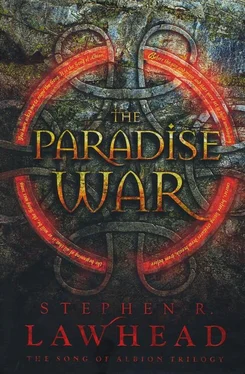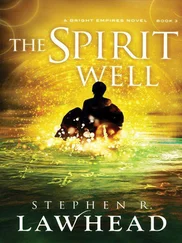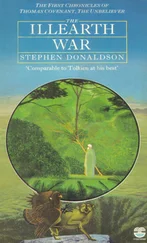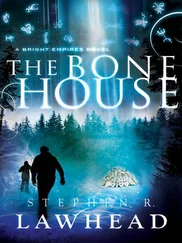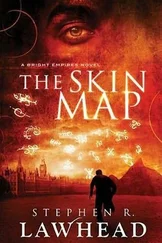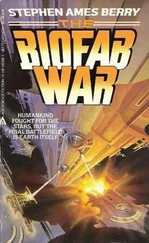I woke, if waking it was, in darkness black as pitch. I had dropped the torch and it had gone out. I lay on the floor on my side, knees drawn up, head tucked to my chest. I raised myself up slowly. At my movement, Tegid called out, «Where are you, lord?»
«I am here, Tegid,» I answered. My face hurt, and my head, and limbs. I had thrashed around so much I was bruised in a hundred places; I ached all over.
I heard a rustle of clothing in the darkness and then felt Tegid's fumbling hand brush my shoulder as he reached for me. «Are you hurt?» he asked.
«I do not think so,» I said, wagging my sore jaw back and forth. «Nothing is broken, I think I can stand.»
«I have found the torch, but it is burned out. I cannot light it again,» the bard answered, and added in quiet despair, «I do not know how we shall find another.»
I climbed gingerly to my feet, and stood swaying for a moment. Strength returned… and sight. I do not know how it was, but I could see. What had been darkness total and absolute was now merely dim-like the interior of one of Meidryn Mawr's storehouses. I could see in the dark. I could see!
However, this did not strike me as anything more than merely remarkable at that moment. Perhaps it was an aftereffect of the light that had dazzled me. I was grateful for the benefit of sight, but not overcome with amazement. It seemed strangely appropriate that I should be able to see, that my eyes should penetrate the darkness so easily.
«All is well, brother,» I said, «there is nothing to fear.» Then I told him that I could see well enough to find the way back.
I turned to the heap of stone on which lay the corpse of the Phantarch. He was dead, but the song-the Song of Albion– had not died with him. The wise Phantarch had seen to that. I suppose the murderers, hardly daring to rouse one so powerful, had simply heaped stones upon his inert body, slowly crushing the life from the sleeping Phantarch. But not before the canny bard found a way to save his precious treasure.
With strong enchantments the helpless Phantarch must have bound the Song to the stones that covered and killed him. The Song was not lost. The stones at my feet vibrated with it.
I walked quickly to the far side of the chamber and began inspecting the wall. About halfway round the circumference I discovered what I had not been able to see by torchlight: a low passageway, the entrance of which was littered with stone chippings and broken rock. It came to me that perhaps the Phantarch's murderers had not come to the crystal
Chapter 35
Singing Stones
I do not know how long we were in Domhain Dorcha, the place beyond the Heart of the Heart, deep inside the mountain. We made our way to the fortress above as quickly as we could, but the going was torturously labored and slow. Our burdens were heavy, and our way twisted and steep. We followed the path the murderers had used, and each of us carried on our backs a bundle of stones from the Phantarch's gravemound.
A few dozen paces outside the Phantarch's chamber, the tunnel opened onto a natural cavern which had been cut in the softer rock by a swift-running underground river. The river sped by, tumbling recklessly down and down into the depths of the earth, its cascade booming loud in our ears. While the river rushed to its secret destination below, we struggled upward, step by weary step, our cloaks slung on our backs, straining under the weight of the stones we carried.
It was more difficult for Tegid. At least I could see well enough in the darkness to find our way, but he had to trust to my directions. He followed blind, holding to the tail of my siarc, placing his feet in my footsteps. Still, we stumbled and fell, bruising already sore muscles, rising each time slower than the last. We struggled, we grappled for every handhold, hauling ourselves and our heavy packs up and ever upward– up from out of the heart of the mountain, as if from out of the pain and darkness of the very Pit of Uffern.
Our hands, gripping the knotted hanks of our cloaks, chafed and bled from the unrelenting abrasion. The rocks battered our shins, elbows and ribs; the sharp-edged stones in our crude packs pummeled our backs and gouged our shoulders. Our feet slipped constantly on the water-slick rock; our toes were battered, our knees scuffed raw.
«Please,» I groaned with every weary aching step, «please, let us reach the end.»
But the end did not come-only more shadowed passages and dim tunnels filled with the sense-numbing roar of rushing water, and countless stumbling stones to be dodged, clambered over, squeezed under. Each twist and turn in the cavern corridor brought disappointment; every hump and slab of stone brought pain.
Tegid, bless him, never once cried out in his anguish, nor questioned my lead. He bore his pain without a sound; he suffered in silence. He trusted me completely, and I loved him for it. I had heard the Song-or part of it-and I knew what it was we carried with us, but Tegid did not.
Once, when we stopped to rest, I asked him if he had heard the sound I had heard in the Phantarch's chamber. He said he had heard me call his name. I did not remember calling out his name, although I might have. «But you do believe that I heard something?» I asked him.
«I know that you heard something, lord,» he answered. His conviction was unyielding as the rock beneath our feet. I asked him how he knew, but he declined to answer. Besides, talking used up too much energy, and it was difficult shouting over the noise of the crashing water. So we lay in the darkness, weak and exhausted, wondering how much further we had still to go.
When the time came to trudge on, I jostled Tegid gently and we hauled ourselves upright, sore-footed and weak-legged, hoisting the heavy bundles upon our injured backs. Then, slow step by aching slow step, we continued on our way.
It seemed ages, eons since we had left the Phantarch's chamber. It seemed to me as if we had walked in this dim underworld forever-lost spirits, wandering shades, neither completely dead nor fully alive, made to journey between the worlds, bearing the weight of our transgressions on our battered backs until the end of time.
After two more brief rest stops, I noticed the passage we were traversing began to rise under my feet, becoming gradually more steep. Shortly after this-or perhaps days later, I cannot say-we came to a divide. On the right-hand side, the river side, the water frothed from a nearly vertical shaft; the left-hand passage was dry, and this appealed to me. We turned aside from the river and its roaring water, and entered the left passageway.
We had not gone far when I noticed that the walls had begun to narrow, and the cavern ceiling over our heads had begun to lower. Soon I could touch either wall with outstretched hands, and I had to duck my head to keep from bumping it on the rock roof above.
We were being squeezed into an ever more narrow constriction. The further we went, the closer grew the walls and the more cramped the passage between them. Had I made a mistake in leading us this way? Perhaps I had taken the wrong passage, or had missed the way far earlier on. Perhaps we were simply wandering, lost, through endless underground caverns, aimlessly navigating passages with neither beginning nor end.
Doubts swarmed my mind like hornets shaken from a rotten log. Fool! I cursed myself inwardly. What are you doing? Where are you going? What makes you think you can do anything? You are doomed! You are lost. Fool, for thinking you are a match for Lord Nudd and the Coranyid! Give up, little man!
I stopped and stood wondering: should we turn back, or go on? Turning back seemed the wisest thing to do. We could always return here if the other passage proved to be wrong. No one could have come this way. Yet.. . and yet…
Читать дальше
